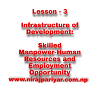Class 12 English Guide
2.Facing Death (By:- August Strindberg)
Characters: 1. Monsieur Durand
Monsieur Durand is the main character of the play who is
a former railroad employee, widower and pensioner. He has been portrayed as a
financially ruined individual. Mr Durand spends his life living with his three
daughters.
2. Adèle 3. Annette 4. Thérèse
Adèle, Annette and Thérèse are the daughters of Monsieur
Durand.
5. Antonio is an Italian army lieutenant who is the only paying
guest at their lodge.
6. Pierre ;- Pierre is the work boy of the Durand family.
Short Summary:
Facing Death, a one-act play by August Strindberg tells the story of Monsieur Durand, a former railroad worker and widower in financial ruin. Durand has three daughters, Adèle, Annette, and Thérèse, who have no future prospects. Despite his efforts to provide for his children, including renting out his home to lodgers, he has been received with ridicule and derision. Monsieur Durand, on the other hand, has a strategy to secure his daughters' financial prospects, even if it means facing his own death. A classic example of dramatic naturalism in Europe. The story of Facing Death is about a father's love for his children, even if it means sacrificing everything. Strindberg dramatizes a heroic sacrifice made by a bankrupt father for the sake of his daughters in Facing Death.
Main Summary:
Monsieur Durand, a former railroad employee, widower, and
pensioner, is the primary character in this play. In this drama, he is
portrayed as a financially ruined individual. Durand lives with his three
daughters, Adele (27 years), Annette (24 years), and Therese (24
years). The relationship between the father and his three daughters is
fragile. They're absolutely out of money. For the past ten years, they have
been in a financial crisis. For the rest of their lives, they have converted
their home into a lodge. Adele works in the kitchen, while Durand does a
variety of other tasks such as serving visitors, cleaning, delivering and
bringing meals, and so on.
Mr Durand's two daughters only attempt to attract the
attention of others in the lodge. Except for playing, singing, and flirting
with customers, they don't help with any other work at the lodge. For years,
the Durand family has lived and spent their lives borrowing money from others.
The family is experiencing financial difficulties. Durand is trying to figure
out how to provide for his three kids after their mother's death, with expenses
piling up. Mr. Durand has various expenses to pay. He has to pay everyone,
including the baker, butcher, and grocer. When Pierre, their work boy, goes to
get bread, he returns empty-handed. He instead brings only unpaid bills. Durand
purchases candles to commemorate the death anniversary of his late son, René,
who died when he was a child. He still adores and misses him.
Durand's lone paying guest at their lodge is Antonio (an Italian army
lieutenant). Durand informs Antonio that they can no longer house him owing to
poverty and a lack of supplies. Durand denies Antonio's offer to pay in advance
and stay for another month. He further claims that the previous spring he had
no visitors for three months before an American family came to help him.
Therese flirts with guest Antonio and they kiss as Durand goes for a coffee
break. When Durand arrives at the door, he is shocked to see them kissing.
He aggressively drives Antonio away from his house, enraged. He also discards
the money he was given. Therese and Annette are dissatisfied with their
father's behaviour. They want the visitor (Antonio) to be present. Both girls
are disrespectful to their father. They even took his glass of milk because he
couldn't bring bread. They force him to drink simply a glass of water. Therese
steals the match as he attempts to light his bribery pipe.
Mr Durand has been hungry for a long time and also eats
rats' feed. He survives, though, because it is not harmful. His three daughters
all accuse him of destroying the house's state. They claim that if mother had
still been alive, the house would not have been ruined. When their mother was
alive, she did not get along with their father Durand. The daughters appear to
side with the mother and only blame the father. In reality, their mother used
to waste money by playing the lottery. She was scolded the majority of the
time. She was threatened with becoming a prostitute.
When the wind blows, Mr Durand instructs his daughters to extinguish the
stove fire and correctly handle the insurance documents. He also claims that he
will deliver insurance money for them. The daughters are now behaving properly
around him. Seeing Therese's dissatisfaction, he agrees to let her marry
Lieutenant Antonio if he sincerely loves her. When she hears this, Therese is
thrilled and returns the match to him. He contacts his eldest daughter
Adele and inquires about the availability of candles. He instructs Adele to
hide documents from a fire insurance policy and begins to reveal the things he
has held hidden within his heart. He was born in the country of France. Even
before the age of recruitment, he had fallen in love with a woman. They came to
Switzerland and gained Swiss citizenship in order to marry. During the final
conflict, he served in the Swiss Army, fighting against the French army. It
indicates the armed himself against his own country. To conceal his guilt, he
claims to have been born in Switzerland.
He also claims that he lost the ancestral and maternal
properties as a result of his mother's carelessness and unwise ventures. They
had used up all of their inheritance in this manner. Durand's children were
taught to dislike their father Durand while his wife was still alive. She was
the one who made them obey her. She blamed her husband the majority of the time
and was successful in turning her children against their father. Mr Durand
remained silent for the rest of his life after her death because he didn't want
his daughters to doubt their mother's decency.
Durand advises
Adele to look after her sisters like a mother. He proposes that Annette, the
youngest daughter, obtain a teacher's job so that she may be in excellent
company and maintain track of her insurance paperwork. He takes the poison from
the glass at the end, and the home is shown burning. Durand set the home on
fire and poisoned himself in order for his children to get 5000 francs in fire
insurance money.
Answer
the following questions:
a. Where does the play take
place?
Answer: The play takes
place in the dining room of Monsieur Durand, a former railroad worker, widower
and owner of the boarding house who lives there with his three daughters.
b. Why do the grocery,
the baker and the butcher send their bills to the Durand household?
Answer: The grocery,
the bakery and the butcher send their bills to the Durand household because the
Durand household hasn't paid their bills for a long time. Therefore, they
are unable to deliver even more goods until the bills are paid.
c. Why does Monsieur
Duran spend money on candles when he doesn’t have money to buy even
bread?
Answer: Monsieur Durand
spends money on candles when he doesn't have money to buy even bread because he
wants to light the candles on the death anniversary of his late dear son, René,
who died in his infancy. Durand is saddened by his passing and still has
a feeling of affection for the dead child. Durand has another intention
to set his house on fire and get fire insurance money to make up for his daughters'
fortunes as they grapple with financial troubles.
d. Why did Monsieur Duran
sell his life insurance?
Answer: Monsieur sold his
life insurance to pay off the debtor's loan. His condition was so miserable
whereas the debtor was quite angry with him for not paying the dues.
e. Why has Monsieur Duran
paid fire insurance?
Answer: Monsieur Durand
has paid fire insurance to make a compensation claim later on. He intends to
get compensation from the fire insurance by burning his house so that the money
given as compensation will help his daughters.
f. How did Monsieur Duran
and Mrs. Duran run out of their inheritances from both the sides?
Answer: Monsieur Durand
and Mrs. Durand ran out of their inheritances from both the sides by Mrs.
Durand's carelessness and foolish speculation. Both of them lost paternal
inheritance and maternal inheritance which was used in raising their daughters.
g. Why does Monsieur
Durand tell a lie about his birthplace?
Answer: Monsieur Durand
tells a lie about his birthplace because of two different reasons.
▪︎ He fell in love with a
woman before his age. He wanted to marry that lady. So he left his birthplace
and moved to Switzerland. To save his and his wife's reputation, he tells a
lie.
▪︎He fought against his
own motherland France from the side of Switzerland. To hide this shame, he
tells a lie.
h. What business is
Monsieur Durand running to make a living?
Answer: Monsieur
Durand is running a boarding house to make a living. He has converted his
house into a lodge to earn money. He provides lodging and dining services
to his guests. There is quite a good facility like a homestay.
i. What plan does
Monsieur Durand have to help his daughters with money?
Answer: Monsieur
Durand plans to commit suicide and set his house on fire. He hopes to get
compensation from the fire insurance policy so that he can help his daughters
with the money. He wants to sacrifice his life for the sake of his three
daughters.
j. How does Monsieur
Durand die?
Answer: Monsieur
Durand dies committing suicide at last. He drinks poison to help his daughters
with the amount of compensation from the insurance policy.
k. Sketch the character
of Monsieur Durand.
Answer: Monsieur
Durand is the main character of the play "Facing Death". He is a
widower, the lodge owner and former railway worker. He is a financially ruined
person who has three daughters. All of them live in the lodge. The relationship
between Durand and his daughters isn't good. Here, in this play, we find him so
loving, caring as well as protective father. Due to his bankruptcy, he is
spending his miserable life along with his three daughters. His daughters hate
him and blame him most of the time. But he keeps on thinking about the well-
being of his daughters. He sacrifices his life for the welfare of his daughters
who hate him. He is full of patience who endures injustice from his late wife
and remained silent for the rest of his life, blaming her for the financial
ruin. He is also a loving husband. He is a patriot too who loves
his native France, although he is forced to live in Switzerland. He is a
tragic hero who faces financial difficulties and eventually ends his life
tragically committing suicide for the well- being of his three daughters.
l. Discuss Facing Death
as a modern tragedy.
Answer:By modern
tragedy, we mean a play dealing with tragic events and having an unhappy
ending, especially one concerning the downfall of the main character. The play
"Facing Death" is a modern tragedy as it ends with the tragic
death of the protagonist Mr. Durand. Modern tragedy deals with realistic
representations and common problems. Realism and naturalism are the main
features of modern play.
The protagonist of a modern tragedy is a common man. Furthermore, modern tragedy deals with the problems of the modern individual such as dysfunctional family relationships, socio-cultural problems, loneliness, etc. Characters become victims of their socio-cultural environment, fate, economic class, gender, external environment, etc. Here in this play, we find the exact features of modern tragedy. This play has presented the life of common modern man with an immense crisis in his life. Due to economic hardships, he has been suffering a lot along with his three daughters. In the play, we can easily find problems of bad relationships and poor economic status. Mr. Durand, a common modern man has suffered a lot due to economic difficulties. This play also ends with the tragic downfall of the main character Mr. Durand. He kills himself and even burns his house for the welfare of his three daughters. This play has presented realism as well as naturalism.


.png)


.png)
.png)
.png)


.gif)



0 Comments